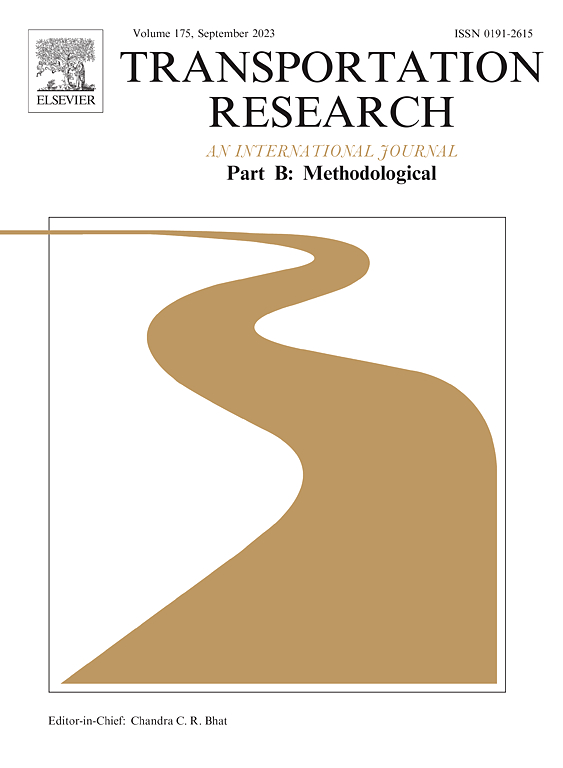高速铁路网客运与不确定货物混合运输的稳健列车运输规划
IF 6.3
1区 工程技术
Q1 ECONOMICS
引用次数: 0
摘要
客货混运是减少环境污染、提高铁路系统服务水平的有效策略。本文研究了高速铁路(HSR)网络中客货混合运输的稳健列车组成和运输安排问题。在考虑客运需求确定性的情况下,提出了基于网络的鲁棒优化模型来解决货运需求的不确定性。该模型利用时空网络表征乘客和货物的运动。为了考虑各种可能的情况,模型中集成了多面体不确定性集。此外,我们开发了一种新的精确算法,称为B-C&;CG,它利用Benders分解的优势来解决确定性乘客子问题,利用列约束生成(C&;CG)的优势来解决鲁棒货运子问题。这为为我们的问题制定的RO模型提供了一个有效的解决方案。目标是同时优化列车运营成本、旅客广义出行成本和最坏情况下货运出行成本。此外,基于高铁网络的实际实例进行了一系列数值实验,验证了B-C&;CG算法的有效性和所提RO模型的优点。结果表明:(1)新算法在计算时间上优于Benders分解算法和混合算法(B-BC&;CG),其中B-BC&;CG与B-C&;CG不同,混合算法同时使用Benders分解和C&;CG来处理鲁棒货运子问题;(ii)可以通过改变与不确定货运需求相关的参数来控制稳健性程度;(iii)与标称规划模型和随机规划模型相比,所提出的RO模型可以改善多面体不确定性集下的最坏情况解。本文章由计算机程序翻译,如有差异,请以英文原文为准。
Robust train carriage planning for mixed transportation of passengers and uncertain freights in a high-speed railway network
Mixed transportation of passengers and freights is an effective strategy for reducing environmental pollution and improving the service level of railway systems. This study addresses the problem of robust train composition and carriage arrangement for the mixed transportation of passengers and freights in a high-speed railway (HSR) network. Specifically, a network-based robust optimization (RO) model is introduced to address the uncertainty in freight demand while considering deterministic passenger demand. The model utilizes space–time network representations to characterize the movements of passengers and freights. To account for various potential scenarios, a polyhedral uncertainty set is integrated into the model. Moreover, we develop a novel exact algorithm called B-C&CG, which utilizes the strengths of Benders decomposition for solving the deterministic passenger sub-problem and the strengths of column-and-constraint generation (C&CG) for solving the robust freight sub-problem. This provides an efficient solution to the RO model formulated for our problem. The objective is to optimize the train operating cost, passenger generalized travel cost, and the worst-case freight travel cost simultaneously. Additionally, a series of numerical experiments based on the real-world instance in a HSR network are conducted to verify the effectiveness of the developed B-C&CG algorithm and the advantages of the proposed RO model. The results demonstrate that (i) the newly developed algorithm outperforms both the Benders decomposition algorithm and the hybrid algorithm (B-BC&CG) in terms of computing time, where the latter differs from B-C&CG by using both Benders decomposition and C&CG to handle the robust freight sub-problem; (ii) the degree of conservatism can be controlled by altering parameters related to uncertain freight demand; (iii) the proposed RO model can improve the worst-case solutions under polyhedral uncertainty set, compared to nominal and stochastic programming models.
求助全文
通过发布文献求助,成功后即可免费获取论文全文。
去求助
来源期刊
CiteScore
12.40
自引率
8.80%
发文量
143
审稿时长
14.1 weeks
期刊介绍:
Transportation Research: Part B publishes papers on all methodological aspects of the subject, particularly those that require mathematical analysis. The general theme of the journal is the development and solution of problems that are adequately motivated to deal with important aspects of the design and/or analysis of transportation systems. Areas covered include: traffic flow; design and analysis of transportation networks; control and scheduling; optimization; queuing theory; logistics; supply chains; development and application of statistical, econometric and mathematical models to address transportation problems; cost models; pricing and/or investment; traveler or shipper behavior; cost-benefit methodologies.

 求助内容:
求助内容: 应助结果提醒方式:
应助结果提醒方式:


